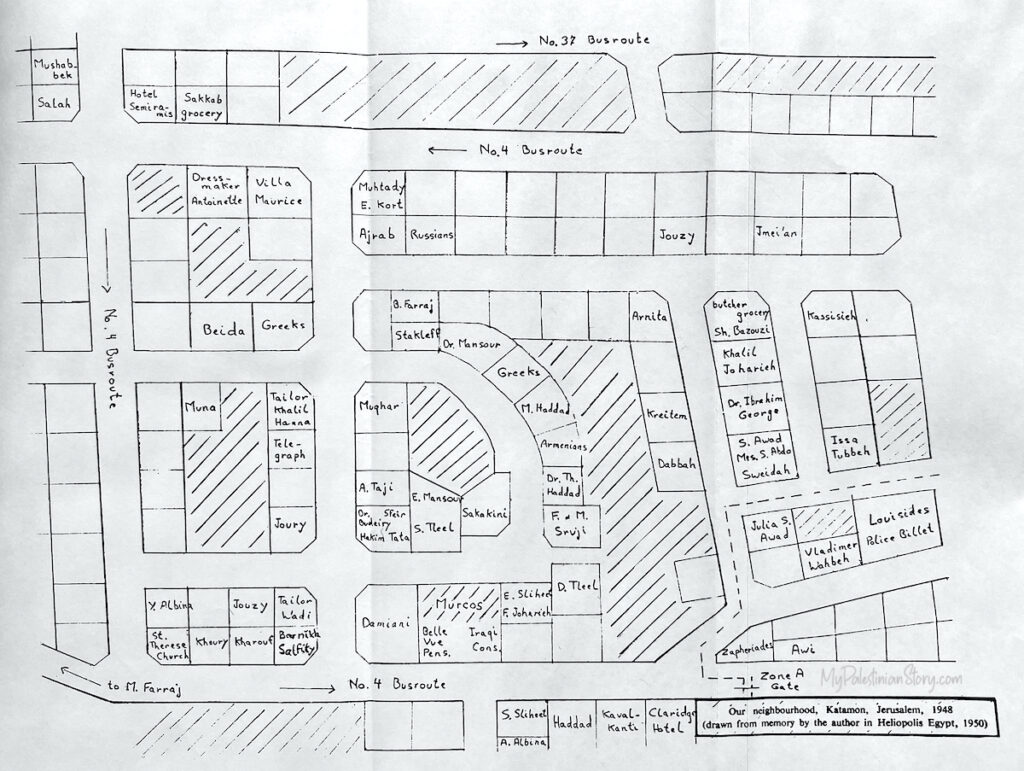In August 2012 my aunt Cynthia from New York forwarded me an email from a lady called Mona who in her turn was forwarding an email from a Dr Dana Olwan, at the time Assistant Professor in a British Columbia university (and currently at Syracuse Uni). Dana wrote:
The reason I am writing to you is because I am involved in a project entitled Qatamon in Colour. This project, which is funded through an Art/Research grant from the Canadian Social Sciences and Humanities Research Council of Canada, aims to locate and collect the stories of Palestinian residents of Qatamon who were forcibly removed from their homes in 1948. We are in our first stages of our project and hope to locate Palestinians who lived in Qatamon in order to interview them about their experiences and histories. We will then seek their permission to collect their stories and produce a video installation that will be screened on their own houses in Jerusalem. The project has various stages, including remapping Qatamon through an online website and revealing its multiple histories…
She explained that they were hoping to locate old residents of Katamon or their descendants to participate in the project.
Being such descendant and one who was passionate about family history, I jumped at this and replied:
… My mother and her family used to live in Katamon. They were a Greek family and lived two doors up from the hotel Semiramis…
My grandfather, Manolis Kassotis, was a nephew of the Patriarch of Jerusalem and used to manage a big estate that belonged to the Patriarchate. He lived in Katamon with my grandmother, Paraskevi, née Schtakleff (sister of Cynthia’s father) and their three daughters: Vasso, Anna (my mother) and Mary.
They left Jerusalem in May 1948 and were never allowed to return. My mother was 18 at the time. They settled in Cyprus where all three sisters married Cypriots. There were quite a few Greek Palestinians in Cyprus and used to have frequent get-togethers. (Few still left, many have died.)
I’ve been raised on stories of Palestine, of Jerusalem, Katamon and the Greek community there, and have witnessed first-hand the pain and incurable nostalgia caused by their loss. I am fascinated by family oral history and in recent years have started an effort to collect/record the stories from various members of the family.
In 1986 mum and I visited Jerusalem together and found their home. It was a very emotional experience, particularly for my mother who hadn’t been back in nearly 40 years.
Your project sounds very interesting and I’d be v. happy to participate if you think I can contribute in any way…
I went on to explain that I lived in San Francisco but spent long summers in Cyprus where I was at that time. I also forwarded the email to other family friends from Palestine in case they were interested.
And out of courtesy to Mona, I copied her on my reply. Within the hour, she wrote back, thanking me, informing me that she lived in Berkeley (across the bay from San Francisco!) and suggesting that we get together upon my return to the US. She had a lot to share with me regarding Katamon, and the Schtakleffs in particular.

I will be writing a lot more about Mona in later posts as she has not only become a dear friend, but our relationship has been full of serendipitous surprises related to our family histories.
From the project, I had no word for over a year. They resurfaced in September 2013 explaining that their project was just beginning to take shape and were wondering if I were still interested. Of course I was!
In late November, by which time I had returned to my San Francisco base, I met via Skype the project leader/owner, Dr Dorit Naaman, a film theorist and documentarist from Jerusalem, teaching at Queen’s University, Canada, who was on a sabbatical in Jerusalem doing research on the ground.
Dorit, Dana and I started meeting regularly over Skype, exchanging information, thoughts and ideas. As the time of my summer migration to Cyprus approached, I suggested I visit Dorit in Jerusalem, which I did in July 2014. (I shared some reports from the trip on Facebook and I will re-post in this blog, too).
Dorit is once again spending a few months this summer in Jerusalem, to continue her work on the project which is now morphing into an interactive documentary, and I’m planning on visiting again in July.
The project has given me the impetus to continue my research into family history and to do so in a more systematic manner—hence this blog. It has also caused me to follow different paths which have led to more stories, more interesting people (some of them newly found relatives) and more fascinating experiences which I will be sharing here. ❖

I lived in Katamon on the map showing property of an Armenian and is our property would like to see a picture